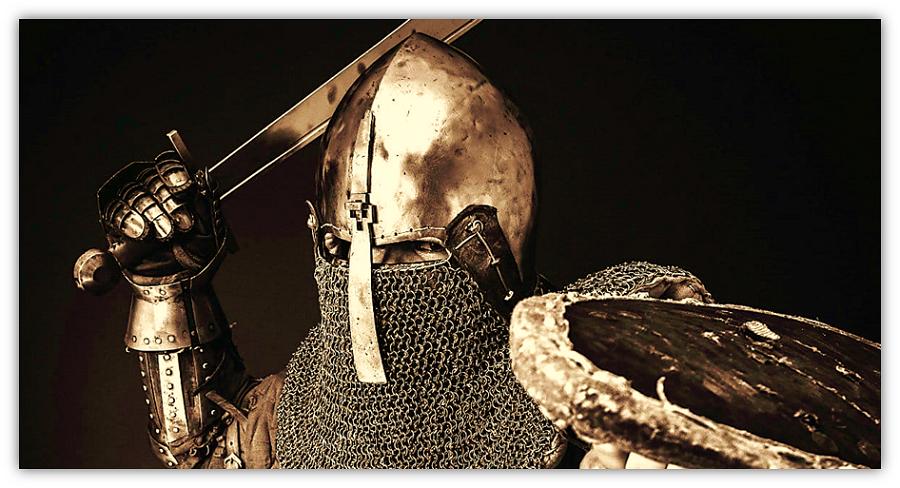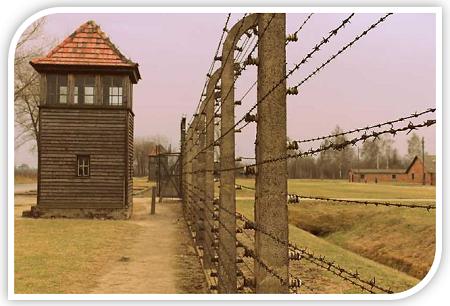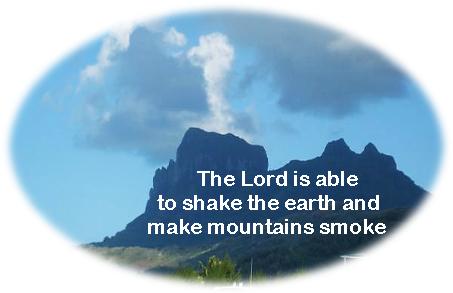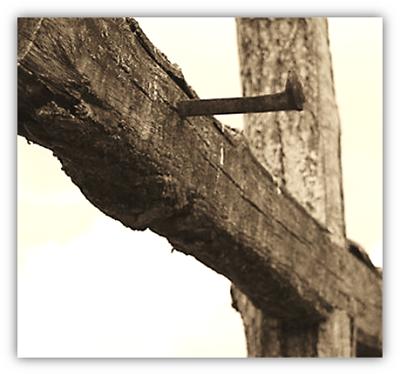Purposeful Violence
Purposeful Violence

How is it possible that God, who is love, employs so much violence? Time and again he breaks out in wrath chastising man. Or is that just typical of the Old Testament? How can you live with a God who does not shy away from violence?
Old Testament Violence⤒🔗
The Bible is a book full of violence. It abounds with stories in which people are put to death. Time and again blood flows in wars or blood feuds. In itself that is nothing unusual. There are many more books in which blood is shed freely. Violence and bloodshed are after all part of the reality in which we live. If nothing else, the Bible cannot be accused of being unrealistic.
The problem of violence and blood in the Bible lies especially in the fact that it is God Himself who puts people to death, or commands people to do so in His behalf. With the exception of eight people he leaves the entire world population to drown in the waters of the great Flood. He kills all the firstborn in Egypt and lets Pharaoh’s army perish in the Red Sea. He tasks his people to destroy all the inhabitants of Canaan. After David had undertaken a census, God kills 70,000 Israelites with pestilence. He has Israelites and Judeans exterminated at the hands of the Assyrians and the Babylonians. He gives the flesh of the troops and allies of Gog as food for birds of prey and wild animals (Ezech 39:4). According to Isa 34:2-3 he destines all nations to the slaughter, so that blood will flow from the mountains.
All the examples of divine wrath and violence just mentioned, stem from the Old Testament. People often think that the New Testament does much better in this regard. In the New Testament God and Jesus Christ supposedly keep violence and bloodshed more at arm’s length. To be sure, there is some validity in this. In 2 Kings 1 at Elijah’s request, fire comes down from heaven and twice destroys fifty men. Yet, in Luke 9:54-55 John and James seek to have fire come from heaven to destroy the inhabitants of a Samaritan village in which Jesus and His followers are not welcome, but Jesus forbids it. When Peter reaches for his sword, Jesus commands him to sheath it. He warns that whoever will resort to the sword, will perish by the sword (Matt 26:51-52; John 18:10-11).
False Dilemma←⤒🔗
When reading the New Testament, one can indeed get the impression that there are less casualties than in the Old Testament. But that changes entirely when you arrive at the Revelation to John. Revelation 6:8 describes how upon the opening of the fourth seal, death and destruction is sown amongst a fourth of the inhabitants of the earth. At the sounding of the third trumpet many people die as a result of bitter water (Rev 9:15-18). Rev 19:17-21 paints a scene reminiscent of the annihilation of Gog in Ezech 39: the birds gorge on the flesh of kings, officials, free men and slaves. All this happens under the direction of God and the Lamb, Jesus Christ. Whoever is destined to drink the cup of God’s wrath will be perpetually tortured by fire and brimstone (Rev 14:9-11). From the great winepress of God’s wrath flows a stream of blood for a distance of 1600 furlongs. That is more than 300 kilometres of blood!

You could have the initial impression that God uses violence less in the New Testament compared to the Old, but that impression becomes untenable when you include Revelation. Then you will see that really God’s wrath in the New Testament burns no less than it does in the Old.
The Same God←⤒🔗
So, could it perhaps be that in the Old Testament God continuously intervenes with punishment, while in the New Testament the outbursts of God’s wrath are kept for the final judgment? The Revelation to John indeed outlines how God will bring an end to this world with his punishing judgment and will establish a new heaven and earth. But John’s visions also deal with judgements, which God executes now already, between the time of Christ’s ascension and His return.
The difference between the Old and the New Testaments has more to do with the question whom God charges to apply violence. In the Old Testament it was the people of Israel, who were to do it by taking possession of the Promised Land. The Israelites waged the wars of the LORD. The New Testament church may not reach for the sword. Her task is the proclamation of the Good News of the saving work of Jesus Christ. The application of violence does not fit with that; not with the Christian congregation. But the government does carry the sword to meet out the deserved punishment upon reprobates (Rom 13:4). So the sword is still there. In respect of the application of violence there is a difference between the Old and New Testaments. That difference coincides with the changed situation in the history of salvation. God’s people no longer are a nation, which may defend itself against other nations by war and violence. God’s people now live dispersed among unbelievers. They must win hearts for the gospel, but leave judgment to rest in the hands of God (compare the parable of the weeds in the field; Matt 13:24-30, 36-43).
Where it comes to God himself, there is no fundamental difference. In Isa 63:1-6 God appears in garments stained red from the blood of the nations He trampled. Those blood-soaked garments return in Revelation 19:13. There they make up the dress of the rider on the white horse, whose name is “Word of God”. That name is identical to that of God’s Son, Jesus Christ in John 1. That demonstrates the strong similarity between Old and New Testament in this regard. In the Old as well as the New Testament, God reveals Himself as a devouring fire (Deut 4:24; Hebr 12:29). So you can’t solve the problem of God’s anger and violence by fabricating contrasts between the Old Testament and the New. The correlation between both parts of the Bible is too great for that.
Sometimes Violence is a Must←⤒🔗
It seems that Christians in Western Europe these days have more of a problem with what God in His anger does, than Christians living elsewhere, or in different times. We live in a structured society, with a reasonably well-functioning justice system. We abhor what took place in the WWII, in Srebrenica or Rwanda, and rightly so. That makes us sensitive to the application of violence. We can hardly imagine that God would put to death infinite numbers of people. We struggle to rhyme that with His goodness. That is different for people who have experienced concentration camps or were locked up in a Jap camp with death ever present. It is different for Christians and others who experienced the slaughter frenzies in Srebrenica and East Africa at close range. Or those who themselves fell victim to abuse or senseless violence. People such as these have much greater understanding for the fact that violent intervention at times is absolutely necessary. There simply is no other avenue to halt worse violence.

Imagine if Hitler or the Japanese in WWII were never dealt with! The question whether or not the nuclear bombs on Hiroshima and Nagasaki were really necessary cannot be answered here in a few sentences. But we can all understand that those who owe their lives to the defeat of the Japanese, have much sympathy for the decision to deploy these abhorrent weapons.
Evil Must Go←⤒🔗
Rev A Francke, in a most worthwhile article published in the November 2011 issue of Nader Bekeken shows that the ruin of God’s enemies is necessary to abolish all injustice in the world. That is completely in tune with for instance Psalm 104. In almost idyllic terms that Psalm lauds creation’s natural wonders and God’s care for His handiwork. In its conclusion, the psalmist states that he will sing God’s glory for the rest of his life. But then suddenly it follows: “May sinners be consumed from the earth, and the wicked be no more.” (Ps 104:35).
The rhymed version reads: “May the wicked from the earth be driven”. I imagine I am not the only one to hold back a little when singing this last line. Perhaps at that moment you are singing about people you know well and whom you love!
Yet, this verse is no dissonant in the Psalm. Ps 104 shows not only how wonderfully creation fits together. The Psalm also shows that creation is under threat. In vs 6-9 the ancient seas flee at the LORD’s rebuke. He determines their bounds, which the waters are not to exceed. That reminds us of the division between land and water on the third day of creation. It is also a reminder of the Flood. At that time, the godlessness of man nearly brought about the destruction of creation. In vs 32 we also encounter something of the endangered state of life on earth. The Lord is able to shake the earth and make mountains smoke. Something like that happens in Isa 24:18-20 as a consequence of the rebellion of those who dwell on earth (compare Ps 60:4 and 82:5). Thus Psalm 104 is well aware that God’s good creation is threatened by the existence of godless and rebellious people. The earth cannot endure forever if God should not remove them.
No new world is possible unless evil is eradicated. Something of this is also evident in God’s command to Israel to exterminate the nations of Canaan. Israel was to do so only after the measure of sin of these nations was full (Gen 15:16 and Deut 9:5). It is not for nothing that this has the appearance of a prelude to the final judgment. For God wanted to make a new beginning with Israel in the promised land. God wanted to dwell there amongst His people and live with them in peace and harmony. That single land was to show something of how beautiful life once was in the Garden of Eden and how blissful life would become for all the earth in God’s new world. The removal of the Canaanite nations was a necessary prerequisite for this, for surely they, by their idol worship, would tempt Israel to break the love bond with their God. And so long as these nations would remain capable of that, God’s wonderful plans would come to nothing. In fact, the end result could well be that Israel would face destruction just like them (Deut 7:1-10, 24-26).
Voluntary Love←⤒🔗
Thus God’s wrath, which leads to the destruction of His enemies, is necessary to curb evil and to make a new world possible. But is there really no other way? God is also able, by His Spirit to renew people on the inside whereby they break with injustice and violence is He not? So why does He not choose to get rid of injustice that way? Why does He choose to kill numerous people instead?

These are not simple questions. I want to look for an answer first and foremost in the manner in which the Holy Spirit works. No human being is able to withstand His power, yet he does not compel anyone. If He would, the results would fall short of the goal which God had set for Himself. He desires to live in a bond with people who readily love Him from the heart. A world of people who relinquish themselves to Him only with complaining and by coercion, is not the world for which He has striven since the beginning. God desires that everything between Him and man comes good again. To that belongs also the opportunity for man (if he is so determined) to take sides against God, with all the terrible consequences this will have.
With this answer we have not solved all problems. As small and insignificant human being you still face the great God. This then is at the same time the second thing we need consider, namely we may ask our questions, but must do so in all humility. For the first question is not, if God could do things differently. The first question is whether we recognise that we have deserved His wrath, and our own doom. The first response befitting us is one of overwhelming thankfulness, because He in His deep love rescues us from burning up in the heat if His rage.
Enmity Essential←⤒🔗
This thankfulness can only reach its full measure when you go back to the beginning. The same goes for our questions concerning the violence God employs in His fury over man’s sin. In order to get any further, we must go back to God’s self-revelation in the Garden of Eden.
In the Garden, God placed man before a choice. He could choose to faithfully carry out God’s charge to cultivate the Garden. He could also make up his own mind about good and evil. Choosing the former would be a choice to life. The latter, a choice to death: “When you eat of it you shall surely die” (Gen 2:17).
Living a self-willed life, apart from God and His will, is death. God makes that clear already in Gen 2. What is clear also, is that death was to be something apportioned to man by God Himself. But God did not share whether or not man would perish as a result violence. Violence is not really mentioned in so many words.
The first Bible text which speaks explicitly of violence is Genesis 3:15. After the serpent had tempted and persuaded the woman to eat from the forbidden tree, and she in turn her husband, God says to the serpent: “And I will put enmity between you and the woman, and between your seed and her Seed. He shall crush your head and you shall bruise His heel.” God here shows how He intends to save man. He does that through bringing about enmity between the serpent and his minions on the one hand and the woman and her Seed on the other. An escape from death cannot occur without enmity. But that enmity comes with violence. The Seed of the woman crushes the head of the serpent and thus God Himself deploys violence to rescue man. In the course of history we find that enmity and consequent violence back time and again, right up until the New Testament. When the promise of the Seed of the woman finally comes to fulfilment, Mary sings about God, who scatters the proud and puts down the mighty from their thrones (Luke 1:51-52). That must happen when God takes pity on Israel and fulfils His promises to Abraham (Luke 1:54-55). Mary’s Son comes to bring peace on earth, but he also testifies of Himself that he came to send fire on the earth and to bring division (Luke 12:49,51).That is obviously needed to reach the final goal, peace.
Violence on Golgotha←⤒🔗
In the end Christ delivered the greatest blow to the serpent from the cross on Golgotha. There the principalities and powers, which had set themselves against God met their defeat and ruin (Col 2:15). But that happened during an outburst of violence from God directed against His own Son. For Jesus Christ, that suffering in God-forsakenness and death at the accursed cross were the worst things he could have suffered from God’s hand.

God uses violence to forge a way towards our rescue. We can’t make sense of this unless we pay attention to what took place on Golgotha. There, on that hill near Jerusalem, God drew His own violence to Himself in the person of His Son. “Come near, see and be amazed everyone”.
Our sins hit upon God so deeply that He erupts in anger. Our sin is so life-threatening and powerful that God counters it with violence. Without violence we cannot be wrested from the power of death, which is life without God.
Thus we see mirrored in God’s fury and violence the fact that there is but one way to life. That is the total surrender to God of His Son Jesus Christ.
When you recognise that, you may still have your questions about what God is doing. But if you have been able to discern God’s love in the violence of Golgotha, you have more than enough reason to lay these questions in His hands.

Add new comment